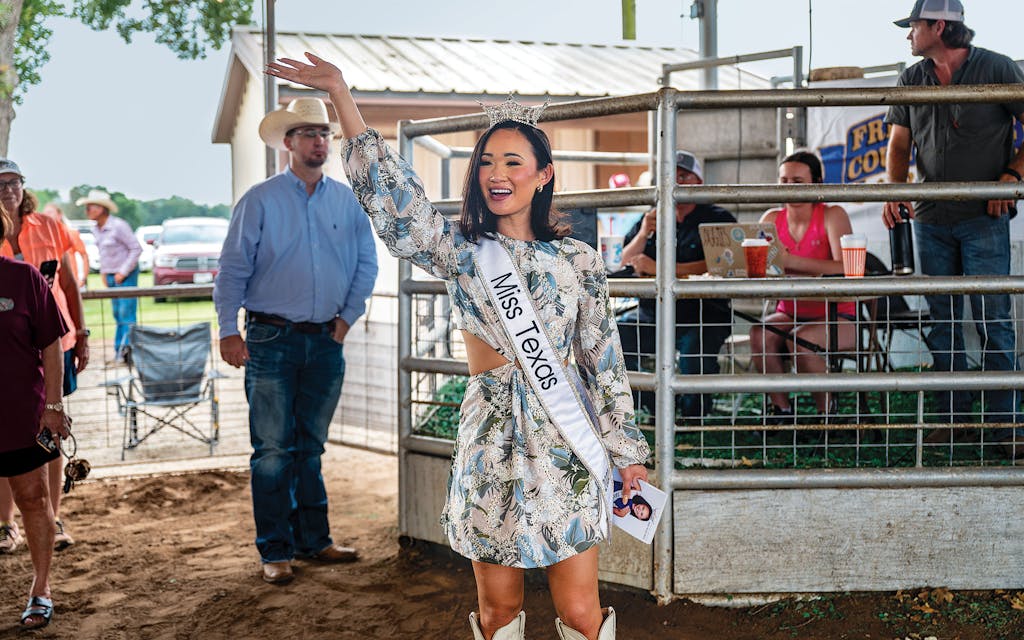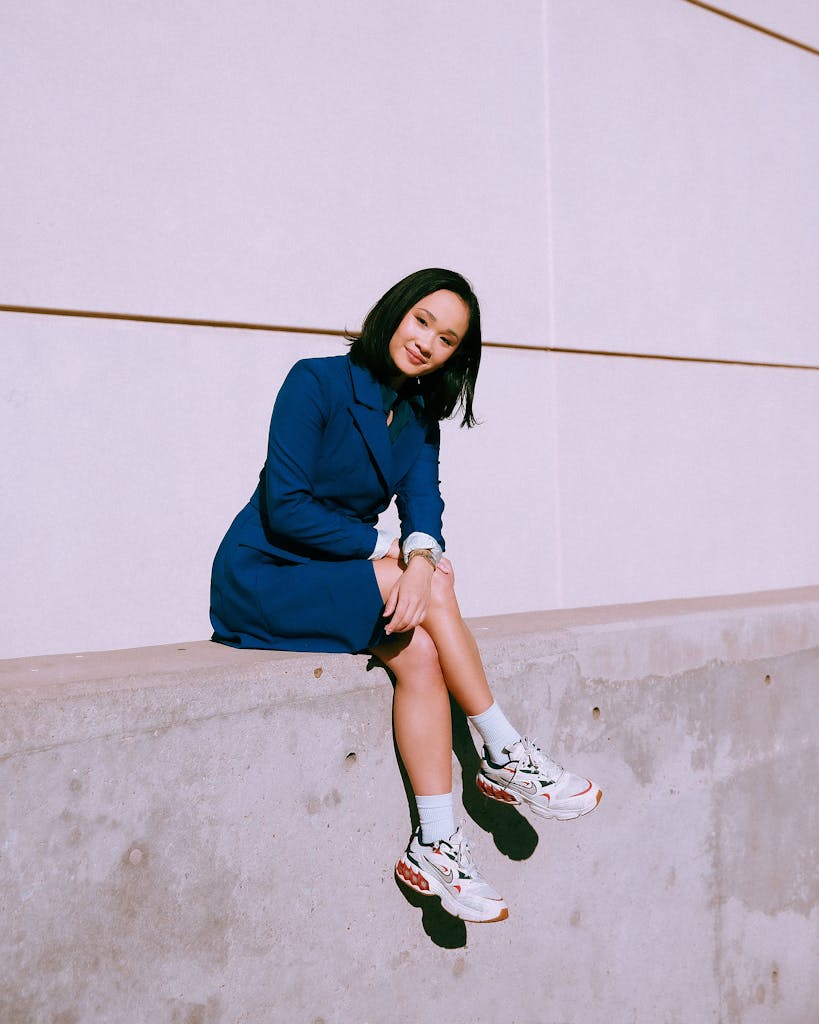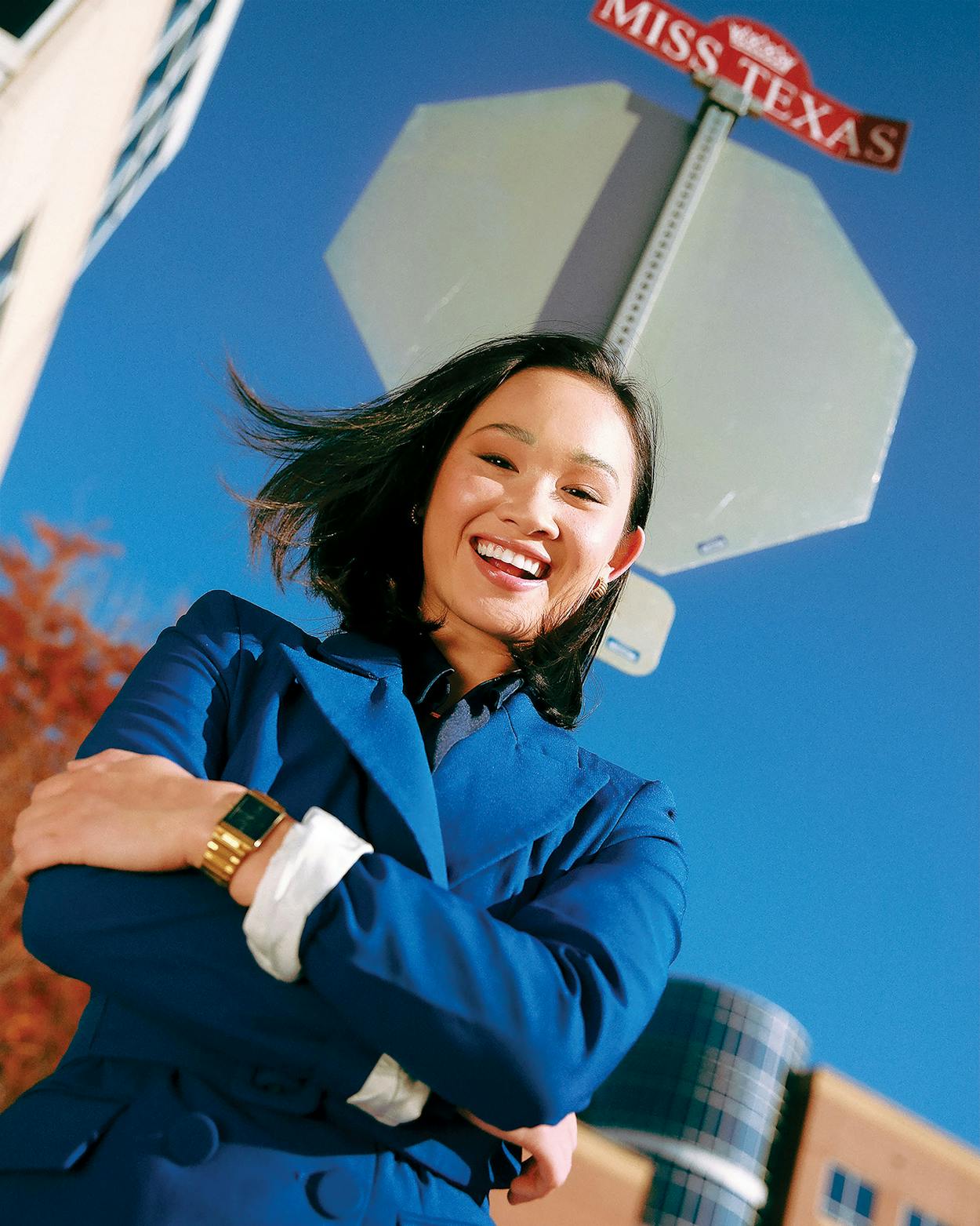Most women who don the crown and sash of Miss Texas have the same ambition: to become Miss America. Averie Bishop, who was Miss Texas 2022, came pretty close, placing third in the pageant. Flush with that near-victory, she made a hard pivot: she decided to take on the political establishment.
The 27-year-old from McKinney, about thirty miles north of Dallas, isn’t your typical agitator. The daughter of a Filipino immigrant mother and a fifth-generation Texan father, she attended college and law school at Southern Methodist University before becoming the first Asian American Miss Texas. In that role, Bishop made some unusual choices, speaking out on controversial issues, such as guns, racism, and reproductive rights. That brought her lots of media attention, giving her the sort of profile that might jump-start a political campaign. Last August she entered the Democratic primary—in which she is running unopposed—for Texas House District 112, in Dallas County, which has been held since 2009 by Angie Chen Button, a Republican from Richardson.
A notable part of Bishop’s campaign is her account on TikTok, where she has more than 830,000 followers. In the brief videos she filmed the day she filed for the primary, which will be held March 5, she sang, danced, jogged, and put on lipstick while sitting in her car. That’s certainly not how Joe Straus or Coke Stevenson ran for office.
Texas Monthly: Your parents were working-class people: your mother was a maid, and your father was a bus driver. What was your childhood like?
Averie Bishop: We were very poor. Both my parents worked two jobs. But they made sure that my brother and I always had a roof over our heads. I was grateful for the hard work they put into giving us an opportunity to pursue the American dream.
TM: You were the first person in your family to graduate from college. What pushed you in that direction?
AB: My mom emigrated from the Philippines. She’s from a family of about eleven siblings, and she grew up in extreme poverty. I’m not talking about relying on food stamps like here in the U.S.—she had to steal toothpaste just to brush her teeth. So she placed a lot of pressure on me to fulfill the opportunities she didn’t have.
I started off as an acting major at Texas State University, but in 2016 Donald Trump was elected, and I made the commitment to someday run for office. So in 2017 I transferred to SMU, because I knew that North Texas, which is where I’m from, was where I wanted to run. At SMU I majored in human rights—I did a year abroad in Poland, studied the Holocaust, traveled across the Deep South in the footsteps of Martin Luther King Jr. I wrote an honors thesis on comprehensive sexual education in Texas.

TM: It’s while you’re at SMU that you start competing in pageants. You were Miss Lufkin in 2019, Miss Dallas in 2020, and Miss Carrollton in 2021. What got you started on that circuit?
AB: Scholarship money. I was entering law school, and even though I had some scholarship money, SMU was still very expensive. Also I should note that my first pageant was when I was thirteen—I entered an Asian American community-based pageant. I wanted to do the glitzier, nationally renowned systems like Miss America, but my mom was nervous. She said, “Why don’t you do this Asian American–oriented pageant?”
Instead of wearing a swimsuit, we had a “cultural attire” category, and I represented the Philippines. I won, and then I took a sabbatical from pageants and about a decade later entered my first Miss America local competition.
TM: Were you also thinking that pageants would be a good launching point for political office?
AB: Yes. The pageant-to-politics pipeline is very strong.
TM: As Miss Texas you were very critical of the state’s Republican leadership. After the Supreme Court overturned abortion rights, you posted a TikTok saying, “When you live in Texas, and all you wanted was a hot girl summer, but now you have a ‘no reproductive rights’ summer.” Did you feel any trepidation talking about those things?
AB: I was nervous. Fortunately, the Miss Texas board was extremely supportive—even before the pageant I was already speaking about social issues online. Members of my generation on both sides of the aisle are concerned about things like the cost of living and the cost of tuition and family planning. I remember the Washington Post called me a political provocateur, and I thought, “Guys, I’m doing the bare minimum right now!”
TM: You were going to a lot of small, conservative towns. How did being so outspokenly liberal go over?
AB: I was going to public schools and talking about diversity and inclusion and the importance of representation. A lot of people would think, “Oh, she’s going to talk about racism and point fingers.” But I spoke about those issues in an age-appropriate way—I incorporated a children’s book I wrote that explains terms like “exclusion” and “inclusion” using the analogy of growing a garden.
I will say that some students were surprised when I walked in. My jaw dropped when one student said, “You’re not Miss Texas! Miss Texas last year was white and blond.” But I learned to take a step back and realize that students in these small towns had maybe never been exposed to an [Asian American] person because perhaps they’ve just never traveled out of their community.

TM: Why the state capitol versus running for, say, Congress?
AB: A lot of people are like, “Why aren’t you running at the federal level?” But they don’t understand that the state level is where it’s at. Our public schools are underfunded? That’s the state. The roads suck? That’s the state. You don’t have access to health care? That’s state budget allocation.
In the state House, we’ve got people having open discussions in the middle of votes on bills. That’s democracy in its purest form. That, to me, is when miracles happen.
One day, maybe, I’ll run for U.S. Congress. A lot of people ask if I want to run for president. That’s definitely a no. I actually would love to run for governor one day.
TM: Do you think Angie Chen Button has represented your district’s interests?
AB: Definitely no, but you probably expected that answer. One of the most recent examples is that she voted for school vouchers. I started block walking this fall, knocking on doors while Angie Chen Button was down at the Capitol voting on that bill. And I’d say seventy-five to eighty percent of the people I talked with said that they wouldn’t support vouchers and that lawmakers should focus on protecting our public schools. So their representative is voting in the complete opposite way of what they want.
TM: People often refer to political campaigns as beauty pageants. You’re a veteran of actual beauty pageants. Which is harder—competing for Miss Texas or running for the Texas Lege?
AB: This campaign is nothing compared to my year as Miss Texas, when I was flying to six different cities in one week while having bronchitis and speaking in front of thousands of students. I had to meet so many communities in such a short span of time and come up with extemporaneous speeches based on their cultural background and history. The time management and patience it took are skills I’m taking with me as I navigate my political campaign. I have a backbone of steel and my Google Calendar is my weapon.
This interview was edited for length and clarity.









